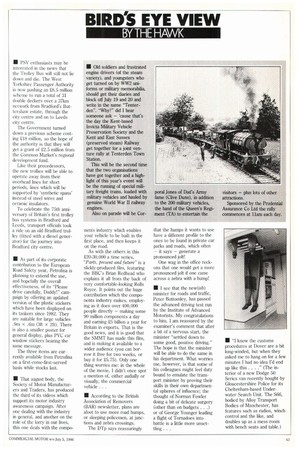BIRD% EYE VIEW
Page 45

If you've noticed an error in this article please click here to report it so we can fix it.
BY THE HAWK
• PSV enthusiasts may be interested in the news that the Trolley Bus will still not lie down and die. The West Yorkshire Passenger Authority is now pushing an £8.5 million scheme to run a total of 31 double deckers over a 37km network from Bradford's Buttershaw estate, through the city centre and on to Leeds city centre.
The Government turned down a previous scheme costing £18 million, so the hope of the authority is that they will get a grant of £2.5 million from the Common Market's regional development fund.
Like their precedessors, the new trollies will be able to operate away from their overhead lines for short periods, lines which will be supported by 'synthetic spans' instead of sled wires and ceramic insulators.
To celebrate the 75th anniversary of Britain's first trolley bus systems in Bradford and Leeds, transport officials took a tide on an old Bradford trolley (fitted with a diesel generator) for the journey into Bradford city centre.
• As part of its corporate contribution to the European Road Safety year, Petrofina is planning to extend the use, and hopefully the overall effectiveness, of its "Please drive carefully, Daddy!" campaign by offering an updated version of the plastic stickers which have been displayed on its tankers since 1982. They are suitable for large vehicles .9m x .6m (3ft x 2ft). There is also a smaller poster for general display, plus PVC car window stickers bearing the same message.
The three items are currently available from Petrofina on a first-come-first-served basis while stocks last.
• That august body, the Society of Motor Manufacturers and Traders, has produced the third of its videos which support its motor industry awareness campaign. After one dealing with the industry in general, and another on the role of the lorry in our lives, this one deals with the compo nents industry which enables your vehicle to be built in the first place, and then keeps it on the road.
As with the others in this £20-30,000 a time series, "Parts, present and future" is a slickly-produced film, featuring the BBC's Brian Redhead who explains it all from the back of very comfortable-looking Rolls Royce. It points out the huge contribution which the components industry makes, employing as it does over 400,000 people directly — making some 90 million components a day and earning £5 billion a year for Britain in exports. That is the good news, and it is good that the SMMT has made this film, and is making it available to a wider audience (you can borrow it free for two weeks, or buy it for 25.75). Only one thing worries me: in the whole of the movie, I didn't once spot a mention of, either audially or visually, the commercial vehicle. . .
• According to the British Association of Removers (BAR) newsletter, plans are afoot to use more road humps, or sleeping policemen, at junctions and zebra crossings.
The Dip says reassuringly that the humps it wants to use have a different profile to the ones to be found in private car parks and roads, which often — it says — generate a pronounced jolt!
One wag in the office reckons that one would get a more pronounced jolt if one came across a zebra with a hump!
• I see that the new(ish) minister for roads and traffic, Peter Bottomley, has passed the advanced driving test run by the Institute of Advanced Motorists. My congratulations to him. I am reassured by the examiner's comment that after a bit of a nervous start, the minister "settled down to some good, positive driving." The hope is that the minister will be able to do the same in his department. What worries me, however, is that some of his colleagues might feel duty bound to emulate the transport minister by proving their skills in their own departmental spheres of influence; the thought of Norman Fowler doing a bit of delicate surgery (other than on budgets . . .) or of George Younger leading a flight of Tornadoes into battle is a little more unsettling • "I know the customs procedures at Dover are a bit long-winded, but when they asked me to hang on for a few minutes I had no idea I'd end up like this . . . ." (The interior of a new Dodge 50 Series van recently bought by Gloucestershire Police for its Cheltenham-based Underwater Search Unit. The 566, bodied by Alloy Transport Bodies of Manchester, has features such as radios, winch control and the like, and doubles up as a mess room with bench seats and table.)




































































































